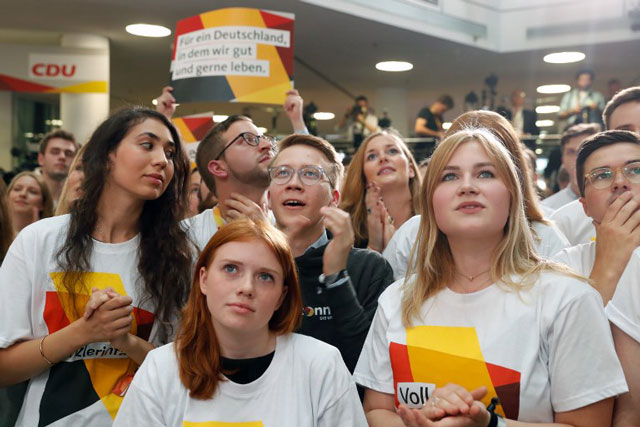
So strong is her support that German media reports tend to ridicule her centre-left challengers as luckless operators on political suicide missions, destined to be roadkill as the Merkel juggernaut powers forward.
Merkel herself usually refuses to mention her rivals by name or engage in spirited political dialogue, which lent a slightly dreamy atmosphere to the election campaigns and infuriated her shadow-boxing opponents.
Martin Schulz, her temperamental challenger, lashed out in June, labelling Merkel’s apparent tactic of keeping politics as unexciting as possible “an attack on democracy” — a comment that earned him stern rebukes from legions of the chancellor’s supporters.
But many political commentators also charge that Merkel has plunged Germany into an apolitical slumber while seeming to grow ever more remote.
Der Spiegel’s Alexander Osang recently labelled her the “woman in amber”, as impenetrable “as a sphinx, diva or queen”, whose speeches were akin to “mass hypnosis”.
– ‘Merkelvellian’ –
Merkel was born Angela Dorothea Kasner in 1954 in the port city of Hamburg.
Weeks later her father, a leftist Lutheran clergyman, moved the family to a small town in the communist East at a time when most people were headed the other way.
Biographers say life in a police state taught Merkel to hide her true thoughts behind a poker face.
Like most students, she joined the state’s socialist youth movement but rejected an offer to inform for the Stasi secret police while also staying clear of risky pro-democracy activism.
A top student, she excelled in Russian, which would later help her keep up the dialogue with President Vladimir Putin, who was a KGB officer in Dresden when the Berlin Wall fell in 1989.
During that momentous upheaval, Merkel joined the nascent Democratic Awakening group, which later merged with the Christian Democrats (CDU) of then-chancellor Helmut Kohl, who fondly if patronisingly dubbed Merkel his “girl”.
But Merkel’s mentor was not the last politician to underestimate her and pay the price.
When Kohl became embroiled in a campaign finance scandal in 1999, Merkel openly urged her party to drop the self-declared “old warhorse”.
The move, which has been described as “Merkelvellian”, kicked off her meteoric rise.
As an outsider, she remade the CDU, anchoring it in the political centre by pushing progressive social policies, abolishing compulsory military service and scrapping nuclear power.
She emerged as Europe’s go-to leader during the debt crisis, though she was derided as a puritanical “austerity queen” in the worst-hit southern countries.
As she starts her fourth term, there is no challenger in sight, but plenty of challenges ahead for Merkel, whom New Yorker magazine just labelled “the most powerful woman in a world filled with unstable men”.
 The Independent Uganda: You get the Truth we Pay the Price
The Independent Uganda: You get the Truth we Pay the Price





